A car that runs on air and water. A computer controlled by thoughts. A remote-controlled robotic snake that transmits video imagery inside collapsed buildings. A high-tech crutch that enables paraplegics to walk again.

These were a few examples of the high-tech wizardry President Obama examined at the Israel Museum with his tour guide, Israeli Prime Minister Benjamin Netanyahu, Thursday during the American president’s trip to Israel. The exhibit at the museum was a way for Netanyahu to show off what Israelis sometimes like to say is their greatest natural resource: brains.
Following a very serious tour of the exhibit containing the Dead Sea Scrolls, the high-tech exhibit was a chance for Obama to relax and have a little fun.
“Uh-oh, who’s this guy?,” Obama said as he shook hands with a scientist wearing what looked like a fishnet skullcap with tiny light bulbs. The man, it turns out, was wearing the latest brain scanner from ElMindA, an Israeli company that makes brain scanners for detecting diseases and head injuries—and had even worked with the Pittsburgh Steelers to better help detect concussions. As he explained the product to the American president, Obama nodded and called it “a great idea.”

Obama was particularly impressed with a company called Phinergy. They have developed a prototype car battery that provides energy and fuel by “breathing” oxygen and then using the result to oxidize zinc and other metals. The prototypes were promising enough to land the Israeli startup a contract with the French-Japanese automakers Renault-Nissan. When Obama heard this he said, “You need to talk to Ford or GM about this.” Phinergy’s CEO, Aviv Tzidon, then asked seriously, “Do you have any connection with them?” Obama nodded and then instructed his staff to get Tzidon’s information.
When Obama was presented with a demonstration of the robot snake, a remote-controlled robot made of small sections that have their own computer and sensors, he remarked, “My wife would definitely not like this.”
The exhibit did not just contain examples of Israeli innovation. President Shimon Peres helped introduce Obama to two Palestinian Arabs who were participating in a program called MaanTech. The name is based on the Arabic word for “together.” Peres told Obama, “The Arabs in our country feel discriminated against and it’s true. One reason is they do not have high-tech.” Peres then explained how the project, funded in part by Cisco Systems, helps bring Arab Israelis and Palestinians who study engineering into jobs with high-tech Israeli companies. “That’s a great idea,” Obama said. He then met with two of the students and posed for a picture.
The star of the technology show was a prototype thought computer from three graduate students at Ben Gurion University. Wearing a cap that reads brainwaves, one of the students showed that as he thought about different items such as a car, his favorite song, or a flower—a cursor moved to different colors on a computer screen that controlled what the user wanted to do. Obama who was observing this with Netanyahu quipped, “These guys have deeper thoughts probably than the two of us.”
At the end of the presentation, Obama met with three middle-school students from Haifa. They showed him a one-foot-high robot that looked like a transformer. The idea behind the mini-robots was to help handicapped people in their homes. At the end of the brief talk, the robots served Obama and Netanyahu a piece of matzo in honor of the Passover holidays. “That’s good matzo,” Obama said. “Todah rabah,” the Hebrew phrase for “thank you.”





